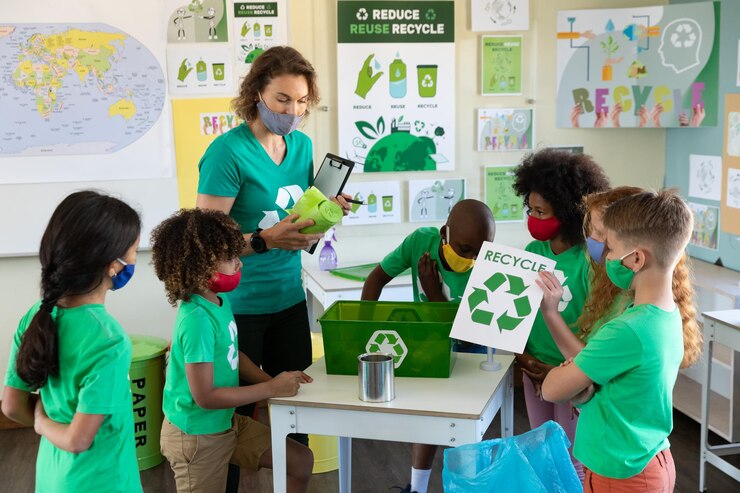
Introduction:
In the modern business landscape, sustainability is no longer a mere option but a vital imperative. The MYRA School of Business (MSB), recognized as One of the Best PGDM College in Bangalore, is leading the way in integrating green practices into its operations and curriculum. Its commitment to sustainability reflects a broader vision of creating responsible business leaders who can drive environmental stewardship and sustainable development. This article delves into the College’s comprehensive approach to sustainability, exploring how it is embedded in the school’s practices, curriculum, and culture.
The Importance of Sustainability in Business Education
Sustainability in business education is essential for several reasons:
- Addressing Global Challenges
Sustainability education equips future business leaders with the knowledge and skills to address pressing global challenges such as climate change, resource depletion, and social inequality.
- Enhancing Corporate Responsibility
Integrating sustainability into business education promotes corporate responsibility, encouraging companies to adopt ethical practices and contribute positively to society and the environment.
- Driving Innovation
Sustainability fosters innovation by encouraging the development of new products, services, and business models that minimize environmental impact and create social value.
- Meeting Consumer Expectations
Consumers increasingly prefer companies that demonstrate a commitment to sustainability. Educating future leaders about sustainable practices ensures businesses can meet these expectations.
- Ensuring Long-Term Success
Sustainable business practices contribute to long-term success by reducing risks, enhancing reputation, and ensuring compliance with regulations and standards.
A Pioneer in Green Practices
The College has made sustainability a core component of its mission. The school’s commitment to green practices is evident in various aspects of its operations, curriculum, and community engagement. Here’s how it is leading the way in sustainability:
-
Green Campus Initiatives
It has implemented several green initiatives on its campus to reduce its environmental footprint and promote sustainability:
Energy Efficiency
The campus is designed to maximize energy efficiency through the use of energy-efficient lighting, HVAC systems, and building materials. Solar panels are installed to harness renewable energy, reducing reliance on non-renewable sources.
Water Conservation
It employs water conservation measures such as rainwater harvesting, efficient irrigation systems, and water-saving fixtures. These efforts help reduce water consumption and promote sustainable water management.
Waste Management
The school has a comprehensive waste management system that includes recycling, composting, and responsible disposal of waste. Initiatives to reduce single-use plastics and promote reusable materials are actively encouraged.
Green Landscaping
The campus features green landscaping with native plants that require minimal water and maintenance. Green spaces are designed to enhance biodiversity and provide a healthy environment for students and staff.
-
Sustainability in Curriculum
The College integrates sustainability into its curriculum, ensuring that students understand the importance of sustainable practices and can apply them in their future careers:
Sustainable Business Courses
The school offers specialized courses on sustainable business practices, corporate social responsibility (CSR), and environmental management. These courses cover topics such as sustainable supply chains, green marketing, and ethical leadership.
Interdisciplinary Approach
Sustainability is integrated across various disciplines, including finance, marketing, operations, and strategy. This interdisciplinary approach ensures that students recognize the relevance of sustainability in all aspects of business.
Case Studies and Projects
Students engage in case studies and projects that focus on real-world sustainability challenges. These hands-on experiences help students develop practical solutions and understand the complexities of implementing sustainable practices.
Research and Innovation
The College encourages research on sustainability topics, providing students and faculty with opportunities to contribute to the development of new knowledge and innovative solutions.
-
Community Engagement and Outreach
The College extends its commitment to sustainability beyond the campus through community engagement and outreach programs:
Partnerships with NGOs and Businesses
The school collaborates with non-governmental organizations (NGOs) and businesses to promote sustainability initiatives and projects. These partnerships create opportunities for students to engage in community service and apply their skills to real-world challenges.
Sustainability Workshops and Seminars
It organizes workshops, seminars, and conferences on sustainability topics, featuring experts from academia, industry, and government. These events provide a platform for knowledge sharing and networking.
Awareness Campaigns
The school conducts awareness campaigns on environmental issues, encouraging students, staff, and the community to adopt sustainable practices in their daily lives.
-
Student-Led Sustainability Initiatives
Students at the Colleges are actively involved in sustainability initiatives, demonstrating their commitment to making a positive impact:
Green Clubs and Organizations
Student-led green clubs and organizations promote sustainability on campus through various activities and projects. These groups organize events, conduct awareness drives, and collaborate on sustainability initiatives.
Eco-Friendly Events
Students plan and execute eco-friendly events, ensuring that sustainability is considered in all aspects of event management, from reducing waste to using sustainable materials.
Sustainability Leadership Programs
It offers sustainability leadership programs that empower students to become advocates for environmental stewardship and social responsibility. These programs provide training, mentorship, and opportunities for leadership development.
-
Global Perspective on Sustainability
The College’s commitment to sustainability is reinforced by its global perspective, emphasizing the importance of international collaboration and learning:
International Partnerships
The school has established partnerships with leading international institutions and organizations focused on sustainability. These partnerships facilitate exchange programs, collaborative research, and knowledge sharing.
Global Sustainability Projects
Students and faculty participate in global sustainability projects, working with international partners to address environmental and social challenges. These projects provide valuable insights into global sustainability practices and trends.
Study Abroad Programs
The College offers study abroad programs that allow students to explore sustainability practices in different cultural and geographic contexts. These experiences broaden students’ perspectives and enhance their understanding of global sustainability issues.
The Role of Best PGDM Colleges in Promoting Sustainability
The efforts of the College highlight the important role that the best PGDM colleges play in promoting sustainability. Here’s how these institutions contribute:
- Integrating Sustainability into Education
Top PGDM colleges integrate sustainability into their curricula, ensuring that students are equipped with the knowledge and skills to promote sustainable business practices.
- Fostering Innovation
These colleges encourage innovation in sustainability through research, projects, and collaboration with industry and academic partners. They provide students with opportunities to develop and implement innovative solutions to sustainability challenges.
- Creating Sustainable Campuses
Many Colleges are committed to creating sustainable campuses through green initiatives such as energy efficiency, water conservation, waste management, and green landscaping.
- Engaging with the Community
These institutions actively engage with the community to promote sustainability through partnerships, outreach programs, and awareness campaigns. They create opportunities for students to contribute to community-based sustainability projects.
- Developing Responsible Leaders
By emphasizing sustainability in their education and practices, the best colleges are developing responsible leaders who are committed to ethical practices and sustainable development.
Conclusion
Leading the way in sustainability, the MYRA School of Business is setting a benchmark for integrating green practices into business education. As One of the Top PGDM Colleges in Bangalore, its comprehensive approach to sustainability encompasses green campus initiatives, a curriculum focused on sustainable business practices, community engagement, student-led initiatives, and a global perspective. These efforts not only reduce the environmental footprint of the school but also prepare future business leaders to drive sustainable development and corporate responsibility. By fostering a culture of sustainability, the College ensures that its graduates are equipped to lead the way in creating a more sustainable and equitable world. The school’s commitment to sustainability serves as an inspiration and model for other institutions, highlighting the critical role of business education in promoting environmental stewardship and social responsibility.


